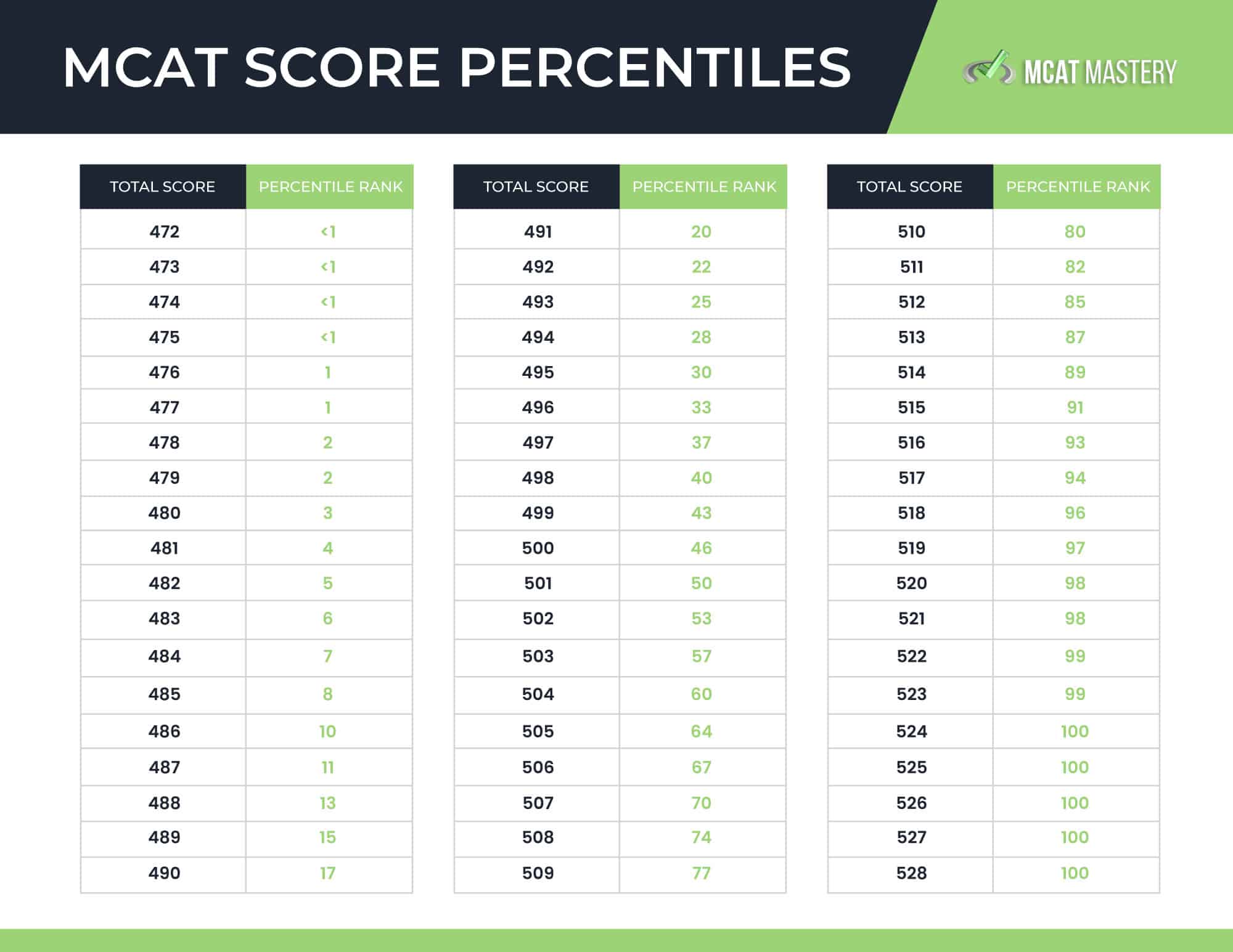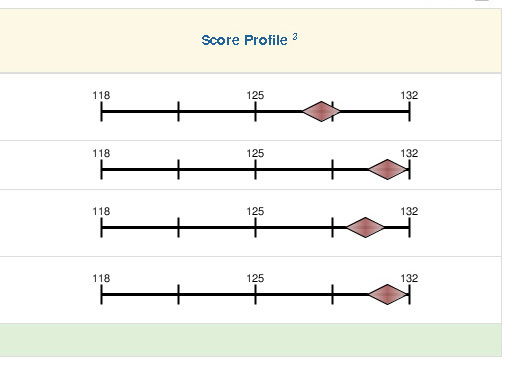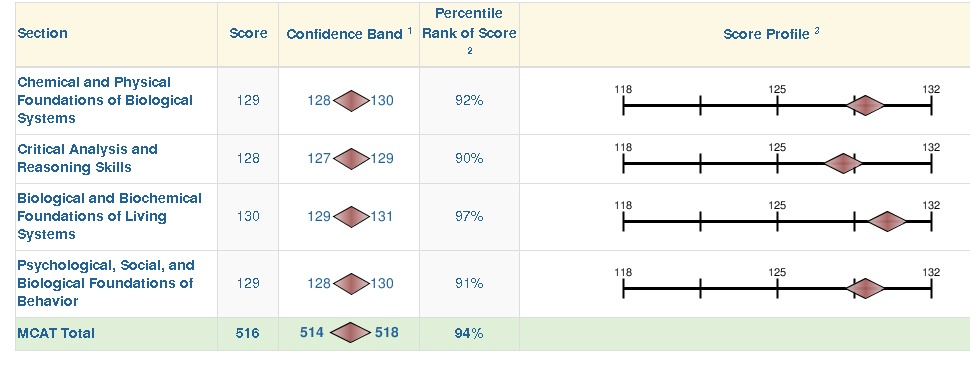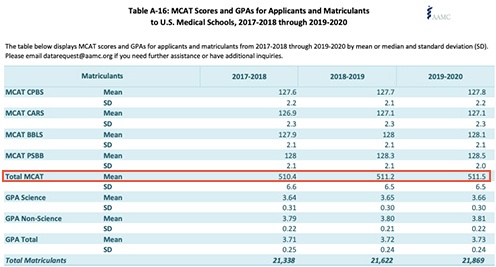As you’re thinking about getting into your dream medical school, you may be wondering…
What is a good MCAT score anyway?
We've interviewed and researched countless 90+ percentile MCAT scorers over the years, and based on our research we have found the following:
To be in the 10% you need a score of 514-528
To be in the 25% you need a score of 508-513
To be in the top 50% you need a score of 500-507
For MOST medical schools a score of at least 508-513 (25th percentile) is a great score, although this can vary depending on the school you wish to attend.
We’ve written an article here on the requirements for the Top 100 medical schools.
Although, simply knowing the overall score is not enough, there is more nuance (including section scores, percentile ranks, etc)
So let's dive into understanding exactly how the MCAT is scored, what score goal you should create, and how you can efficiently reach that score goal without going through all the stress that most premeds endure.
A Complete Chart of MCAT Scores to MCAT Percentiles

Why Is The MCAT Score Important?
Usually medical schools are looking to find a complete package.
First and foremost, they look at your MCAT score and GPA. Other things they look for are your extracurricular activities, medical field experiences such as in volunteer work and research, your leadership, and overall exposure. They also look at your personal statement, letters of recommendation and evaluate you through admission interviews.
At the top of that list, your MCAT score plays a big part in your medical school admission as committees are selective, prompting some programs to have minimum MCAT score requirements.
After all, it provides a snapshot of how you’ll fare in medical school training and the licensing exam in the future.
Now, before you can go on creating your MCAT study plan, any applicant needs to understand first that the key to being successful in this exam is to aim for a good MCAT score.
Having a good score gives you more chances and subsequently, more choices of medical schools you can attend.
But in order to achieve that good score, we need to understand how MCAT scoring works and how the MCAT is scored..
How Does MCAT Scoring Work?
A lot of students have that 'doctor' gene running through their family so if you asked your parents, older siblings or relatives about how the scoring system works, their answers probably weren't accurate...
After all, in 2015, AAMC updated the MCAT to a three-hour exam to a six-hour ordeal of 230 questions. It meant the addition of a few subjects and a huge change in the MCAT scoring system.
The MCAT is currently composed of the following four sections:
- Biological and Biochemical Foundations of Living Systems (BBLS)
- Chemical and Physical Foundations of Biological Systems (CPBS)
- Critical Analysis and Reasoning Skills (CARS)
- Psychological, Social, and Biological Foundations of Behavior (PSBB).
The MCAT is a scaled exam and is scored in a way that accounts for the difficulty of questions answered. Which leads us to understanding the score ranges for each section and for the MCAT overall..
Took the old MCAT?
If you took the old MCAT or are curious about how the old MCAT scores convert to the new MCAT along with their accompanying percentiles, then check out this article here 🙂
The Complete MCAT Score Range Breakdown
Following a 15-point scale, each of the four sections are scored between 118 and 132 which are the lowest and highest possible score, respectively.

When combined, it makes the total score range from 472 to 528. The exam is centered so that the mean and median lie at 500.
Now you might be wondering, "Why is the MCAT scoring system so weird?"
This strange scoring system is born out of the need to level the playing field since different question sets are given each year and some might be more challenging than other versions.
Which is why raw scores are converted to scaled scores through a process called equating, which compensates for slight variations in difficulty.
Sometimes we've had students wonder if their scores are affected by when they take the test or who is in the testing centre writing with them...
Is The MCAT Score Graded On The Curve?
In short, no. Your MCAT score doesn’t depend on the testing time nor the scores of the other test takers who took with you.
AAMC makes it clear that the “exam is scaled and equated so that scores have the same meaning, no matter when you test or who tests at the same time you did.”
Next here's a detailed snapshot of the MCAT score report itself...
What’s in the MCAT Score Report?
The four sections you will see when you receive your MCAT score report are the following:
The Score Column on the MCAT Score Report
The ‘score’ column shows you your scaled score for each of the sections. The grading for MCAT is based on questions answered correctly.
Wrong answers have no additional penalty and are scored exactly the same as unanswered questions. They do not affect your score so it's smart to take an educated guess for questions you are unsure of!
The Percentile Rank Column on the MCAT Score Report
On the other hand, the ‘percentile rank’ shows how your score compares to those of your fellow test takers and shows you their percentage who scored higher or lower than you.
The Confidence Band Column on the MCAT Score Report
The ‘confidence band’ describes the range of accuracy of your section and scores. It acknowledges the inherent inaccuracies that lie in standardized exams because scores can be influenced by different factors.
AAMC explains that it is intended to “discourage distinctions between applicants with similar scores.”
A confidence band of 122-124 means that your score, after taking into account the flaws of the grading system, was actually somewhere between a 122 and a 124.
This eliminates the doubt on the difference in applicant’s raw scores, whether they scored 122 or 124. In turn, this levels the playing field in medical school admission and works in the applicant’s favor.
The Score Profile Column on the MCAT Score Report
Lastly, the ‘score profile’ shows you your strengths and weaknesses on the MCAT. It helps you understand which section you should focus or improve on, in case of a retake.
What MCAT Score Should I Aim For?
Now that you understand how the MCAT is scored and how to interpret the score reports, you may now be excited to start strategizing how to take on the exam. But before one could lay out the plans, we need to have a goal to aim for.
Setting a standard for yourself gives you a concrete goal, not only wishful thinking, which makes it easier to measure your success or improvement.
Also, it helps you break up your large goals into mini tasks to complete which helps you build your confidence as you go through them towards the bigger goal.
Higher MCAT scores are needed to compensate if your GPA is on the low side or if you don’t have as much fluff in your applications.
So what exactly is a good MCAT score?
Well firstly and obviously, the higher your MCAT percentile, the better!
Next, looking at the mean scores of test takers accepted to med-school for each year is useful as a baseline to understanding what is a strong MCAT score.
According to AAMC’s report, in 2018-2019, applicants had a mean total MCAT score of 505.6 while matriculants had 511.2 as the mean total score.
In 2019-2020, applicants scored a mean of 506.1 while matriculants had a mean total score of 511.5.
With this in mind, we encourage our students to aim for 511+ to maximize their chances of acceptance.
It’s also useful to know the acceptance rates and MCAT score requirements of the medical school of your choice.
What Are The Highest MCAT Scores? How To Be In The Top 10% of MCAT Test Takers
Maybe you want to aim high, maybe you’re naturally a high achiever, or you want to get into that top medical school.
If you want to be in the top 10 % of MCAT test takers, you need to have an MCAT total score range of 514-528.
This will put you in the 90th percentile range - applicants who have the best scores.
To achieve this score range, you need to get a score of 129-132 for each section.
What Is A Competitive MCAT Score? How To Be In The Top 25% of MCAT Test Takers
Maybe you don’t need to be on top of the list but still be in the running for the best medical schools.
To have a highly competitive position for admissions, you need to be in the top 25% of MCAT test takers. That means, you have to get a total MCAT score range of 508-513 which requires getting 127-128 in the four sections.
This score range puts you in the 75th percentile (and above). With that score, coupled with a great GPA and portfolio, you’re on your way to that MD dream.
What Is A Good MCAT Score? How To Be In The Top 50% of MCAT Test Takers
If you’re not looking to be accepted in highly competitive programs but still be in the top 50% of MCAT test takers, then aim for a total score range of 500-507.
These are less competitive scores that require you to get 125-126 in the four sections.
What Is A Low MCAT Score?
If you score 499 and below, that will put you below average compared to other test takers. While it might still get you in some medical schools, you’ll have less schools to choose from.
Getting 124 and below in the sections might be a dealbreaker for committees that place emphasis on individual sections which may vary from school to school.
Overall, your MCAT scores are of great importance as it is the primary basis used by application committees to narrow the applicant pool.
Understanding how it works and knowing what the score you want to aim for will help you form a clear goal for your MCAT journey.
Top MCAT scorers researched beforehand and figured out what their medical school of choice required and set a definite target score for themselves.
How To Achieve Your MCAT Score Goal
Abraham Lincoln has been quoted for saying...
"Give me 6 hours to chop down a tree, and I'll spend the first 4 sharpening my axe."
Think of the MCAT as a GIANT tree that you need to chop down. You've already started mentally 'sharpening your axe' by taking the time to understand the MCAT scoring system, and how you can go about strategically creating your score goal...
But there's still a lot more 'sharpening' to do. A LOT more. This is a high yield action that what will make you stand out from all the other premeds.
As you can imagine, almost every test takers is jumping into studying, into 'cutting down the tree'. Why? It's the anxiety that makes us want to 'get to work' right away. Hardly anyone realizes that sharpening the axe, understanding the optimal approach to studying for the MCAT, is also work.
Med-schools know the average students won't succeed in scoring over 500. They want to know who can think strategically throughout this process, because those will be the students who will succeed on this exam. Those will be the students they want attending their school.
So how can you further sharpen your axe? How can you learn the most optimal way to approach this beast of an exam?
Our entire site is dedicated to the first four hours of sharpening the axe - the strategies of how to study for the MCAT. All strategies have been proven to be effective by countless top MCAT scorers. All you need to do is INVEST a few hours in learning them, experimenting with them, and then creating a system for MCAT studying that works for you and your strengths.
We've done the research and we've created the blueprint to the most optimal way of studying. Us doing the research saves you hundreds of hours doing the research yourself. So now you don't have to spend more than 60% of your time 'sharpening' your axe, now you spend less than 5% of your time getting the strategies down.
Now you can spend the rest of your time following a step-by-step roadmap and actually studying in an effective way. Unlike everyone else who going through books 'blindly', trying to figure it out by themselves, along the way.
You can access or learn more about that MCAT success roadmaps here.
Lastly, if you've already started MCAT prep, you know how incredibly daunting this journey is. There WILL be moments of doubt, frustration, anger, confusion, and sadness...
But know that you can make it through. We believe in you. Even though we don't know you personally (yet), we know that if you're determined enough, if you're smart enough to have read all the way up until this point, you're committed. You're in this and there's no stopping you from achieving your doctor dream...
You got this,
The MedLife Mastery Team
Your "MCAT Success" Mentors
Related Reading
- Is 472 a Good MCAT Score?
- Is 473 a Good MCAT Score?
- Is 474 a Good MCAT Score?
- Is 475 a Good MCAT Score?
- Is 476 a Good MCAT Score?
- Is 477 a Good MCAT Score?
- Is 478 a Good MCAT Score?
- Is 479 a Good MCAT Score?
- Is 480 a Good MCAT Score?
- Is 481 a Good MCAT Score?
- Is 482 a Good MCAT Score?
- Is 483 a Good MCAT Score?
- Is 484 a Good MCAT Score?
- Is 485 a Good MCAT Score?
- Is 486 a Good MCAT Score?
- Is 487 a Good MCAT Score?
- Is 488 a Good MCAT Score?
- Is 489 a Good MCAT Score?
- Is 490 a Good MCAT Score?
- Is 491 a Good MCAT Score?
- Is 492 a Good MCAT Score?
- Is 493 a Good MCAT Score?
- Is 494 a Good MCAT Score?
- Is 495 a Good MCAT Score?
- Is 496 a Good MCAT Score?
- Is 497 a Good MCAT Score?
- Is 498 a Good MCAT Score?
- Is 499 a Good MCAT Score?
- Is 500 a Good MCAT Score?
- Is 501 a Good MCAT Score?
- Is 502 a Good MCAT Score?
- Is 503 a Good MCAT Score?
- Is 504 a Good MCAT Score?
- Is 505 a Good MCAT Score?
- Is 506 a Good MCAT Score?
- Is 507 a Good MCAT Score?
- Is 508 a Good MCAT Score?
- Is 509 a Good MCAT Score?
- Is 510 a Good MCAT Score?
- Is 511 a Good MCAT Score?
- Is 512 a Good MCAT Score?
- Is 513 a Good MCAT Score?
- Is 514 a Good MCAT Score?
- Is 515 a Good MCAT Score?
- Is 516 a Good MCAT Score?
- Is 517 a Good MCAT Score?
- Is 518 a Good MCAT Score?
- Is 519 a Good MCAT Score?
- Is 520 a Good MCAT Score?
- Is 521 a Good MCAT Score?
- Is 522 a Good MCAT Score?
- Is 523 a Good MCAT Score?
- Is 524 a Good MCAT Score?
- Is 525 a Good MCAT Score?
- Is 526 a Good MCAT Score?
- Is 527 a Good MCAT Score?
- Is 528 a Good MCAT Score?






